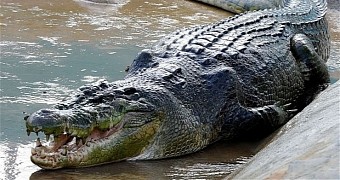Let's see if you can solve this riddle: what could possibly be more terrifying than a crocodile moving in for the kill? Never mind, I'll tell you: a bunch of crocodiles working together to kill and butcher their unsuspecting prey.
Not to beat about the bush, wildlife researcher Vladimir Dinets with the University of Tennessee claims that crocodiles sometimes get together in packs for the sole purpose of catching prey and securing their next meal.
What's more, the specialist argues that, according to evidence at hand, the same is true of other reptiles that are related to crocodiles. More precisely, it appears that alligators and caimans too display this hunting behavior.
Vladimir Dinets says that, having used social media to collect eyewitness accounts and having studied such reptiles in the wild himself, he found that crocodiles and their relatives are no strangers to team work.
On the contrary, it appears that crocodiles sometimes work together to force fish into a compact shoal and then take turns feeding on them. In one case, a massive saltwater crocodile was observed herding a pig into a small lagoon where two other predators were waiting.
As far as alligators are concerned, the University of Tennessee specialist claims that these reptiles occasionally work together to drive fish towards shallow waters, where they can more easily catch them and eat them.
Vladimir Dinets argues that these findings indicate that, contrary to popular opinion, crocodiles and their relatives aren't just mindless beasts. They are complex creatures and are very much capable of displaying sophisticated behavior.
“All these observations indicate that crocodilians might belong to a very select club of hunters – just twenty or so species of animals, including humans – capable of coordinating their actions in sophisticated ways and assuming different roles according to each individual’s abilities.”
“In fact, they might be second only to humans in their hunting prowess,” the University of Tennessee researcher commented on the outcome of this study in a recent interview with the press.

 14 DAY TRIAL //
14 DAY TRIAL //